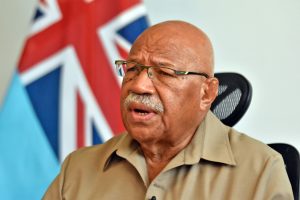Speaking to a rapt audience, Fiji’s Prime Minister Sitiveni Rabuka shared an account of evacuating nearly 200 Fijian pilgrims and international travelers, including Australians and Americans, from Tel Aviv, Israel, in the early days of the ongoing conflict.
Speaking in Canberra days after Palestinian militants launched an attack on Israeli citizens on October 7, he recounted: “We had to go very quickly. I had to cast off my civilian prime minister uniform, get into the other uniform, and told people…‘We have to get our people back.’”
For half of Fiji’s independent existence, former military figures have dominated its leadership, with Rabuka and Frank Bainimarama collectively serving as prime ministers for 27 years.
“When I took office, a lot of people raised their concern that I might once again try to militarize the civil service,” he mused. “But they came in to interview through the Public Service Commission, they were selected, and they were in the right place at the right time for us to very efficiently carry out that operation.”
Employing the renowned Fijian tactic of circuitously making a point, Rabuka’s message was clear: While Fiji’s military has faced criticism for overthrowing elected governments, the nation, and indeed the region, benefit from military strength in crises.
Acknowledging that recent events had altered his speech, Rabuka affirmed they also validated his proposal for a Pacific “zone of peace.”
Amid China-U.S. geopolitical tensions, the concept, which has since evolved into the “Ocean of Peace,” is gaining traction – despite significant dissonance within Fiji’s foreign policy.
In February, Fiji’s Permanent Representative to the United Nations, Filipo Tarakinikini – whom Rabuka highlighted in Canberra as a crucial contributor to the Tel Aviv operation – delivered an oral submission to the International Court of Justice. The submission urged the court to refuse a U.N. General Assembly request for a non-binding ruling on the legality of Israel’s occupation of Palestinian territories.
Fiji and the United States argued against an unprecedented 50 countries, altogether the largest number of parties to an ICJ case since its establishment.
Like Rabuka, Tarakinikini’s peacekeeping leadership credentials were front and center in his remarks.
Echoing Rabuka’s Canberra message, Tarakinikini cautioned: “The events of 7 October 2023 have shown us what could happen if there were a complete and unconditional withdrawal without the necessary arrangements in place to guarantee the security of Israel.”
Human rights groups at home condemned Fiji’s position, decrying the lack of consultation. In a move more characteristic of Bainimarama’s Fiji First government, Fiji Police denied the NGO Coalition on Human Rights a permit for a protest march. Rabuka doubled down, clarifying that Fiji’s stance predated events in Gaza.
Despite his administration’s lauded ability to “move quickly,” Fiji’s foreign policy machinery fails to reflect this agility.
Rabuka’s affinity for the United States harks back to his first prime ministership, when he headed the SVT government in the 1990s. As opposition leader with SODELPA, he attributed his support for Donald Trump in the 2020 U.S. elections to Trump’s alignment with Israel. Now with the People’s Alliance, his alignment with the United States remains unwavering.
His approach to relations with China has been less steadfast. On a 2023 visit to New Zealand, Rabuka acknowledged differences in values and systems, announcing Fiji was reassessing a decade-long policing cooperation agreement with China. He then withdrew from a planned visit to Chengdu.
However, Fiji ultimately maintained the agreement with China, aside from ending the practice of embedding Chinese officers in its police force. Pressed on the China-U.S. competition in Australia last October, Rabuka struck a conciliatory note, reluctant to choose between the two superpowers.
The region has also encountered Rabuka’s self-described evolution from peacekeeper to peacemaker. The Fijian prime minister convinced Kiribati to rejoin the Pacific Islands Forum and calmed discord surrounding former Nauru President Baron Waqa’s nomination as Forum secretary general.
Domestically, a generous assessment would describe the Rabuka-led coalition government’s term as promising but shaky, as it tries to manage a debt-ridden economy while shoring up struggling sectors. Tax reforms to address the debt burden were an expected discomfort, alleviated by forgiving more than $650 million in student loans. Calls for visa-free travel have seemingly registered, with Fijians soon eligible to apply for a new Australian permanent resident visa program.
A less generous perspective would marvel at the speed with which the coalition government has dashed even modest expectations – the political equivalent of snatching defeat from the jaws of victory. The past 16 months have seen infighting, a clumsy Cabinet reshuffle, missteps in upholding regional accords, and glossing over key constitutional concerns. Lagging upgrades to the nation’s ailing health infrastructure contrasted sharply with a $4.4 million Parliament refurbishment and swift interventions for the national rugby sevens coaching staff. The reinstatement of Fiji’s sacked education minister after dismissal for insubordination has heightened frustrations over shifting portfolio allocations.
The announced “whole of government” development of a foreign policy white paper has created an opportunity for diplomacy that reflects citizens’ concerns.
Until then, Fiji’s “Ocean of Peace” is beset by unilateral foreign policy actions, inconsistent support for regional unity, suppressing citizens’ rights to protest, and reinforcing militarization as a condition of security. It bears tidings of an enforced stability from a proponent known to revert to type in uncertain times.
Approaching the midpoint of its term, the coalition government’s efforts to appease contending factions domestically appear to be pleasing no one in the process. Time will tell if Fiji’s foreign policy goes the same way.
































